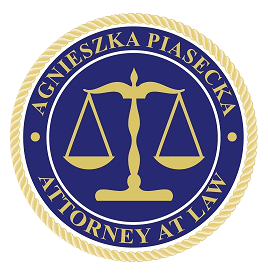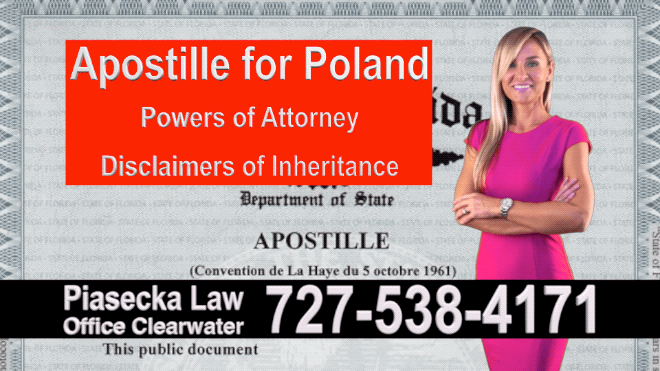
Polish Attorney in Florida, Agnieszka Piasecka, can help you with: Creation of Legal Documents, Translation, Notarization & Apostille Certification for Poland
727-538-4171
Agnieszka “Aga” Piasecka is a Polish speaking attorney in the State of Florida who can help you with the creation and or translation of legal documents in Polish, your notarial needs online (via internet) and with obtaining an Apostille Certification for Poland.
For assistance with Creating and or Translating legal documents, Notarizing and or obtaining an Apostille Certification for Poland please call: 727-538-4171 / 813-786-3911 / 303-475-7212 or visit PiaseckaLaw.com
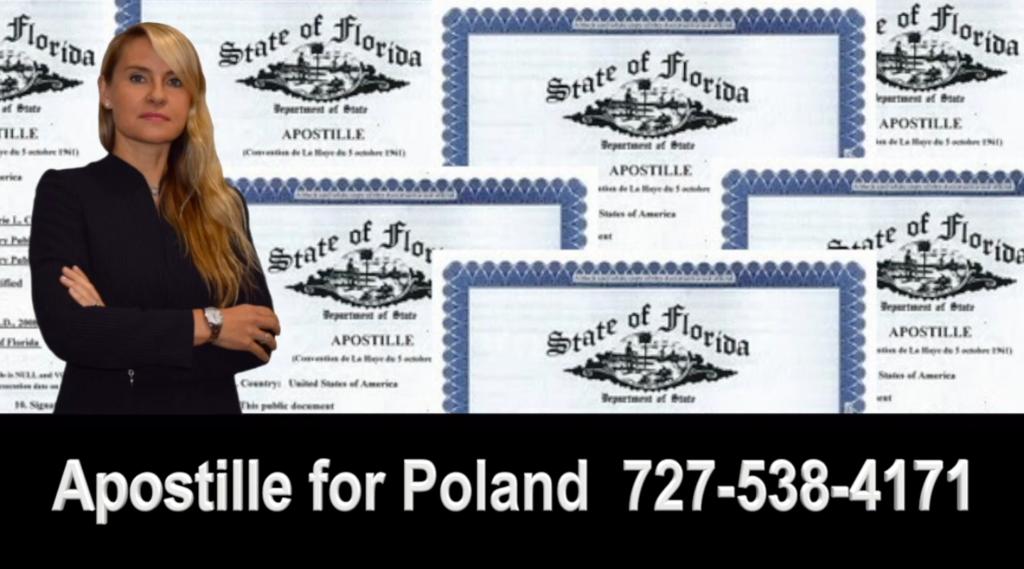
Apostille for Poland, Apostille for Power of Attorney for Poland, Apostille for Disclaimer of Inheritance for Poland
Agnieszka Piasecka is a Polish speaking attorney in the State of Florida. She can assist you with Apostille for Poland, Apostille for Power of Attorney for Poland, Apostille for Disclaimer of Inheritance for Poland, Apostille and Online Notary Services for Other documents, and the Translation of legal documents for immigration and other use.
To obtain an Apostille for Poland please call: 727-538-4171 / 813-786-3911 / 303-475-7212 or visit PiaseckaLaw.com

Apostille Requirements
Apostilles authenticate the seals and signatures of officials on public documents such as birth certificates, court orders, or any other document issued by a public authority so that they can be recognized in foreign countries that are members of the 1961 Hague Convention Treaty. Poland joined the Hague Apostille Convention on August 14, 2005.
The U.S. Department of State only issues apostilles for federal documents to use in countries that are members of the 1961 Hague Convention. Poland is a member of the Hague Apostille Convention and any official document destined for this country requires an Apostille from the Secretary of State.
Federally-issued documents for use in Poland
Federally-issued documents for use in countries that are members of the 1961 Hague Convention may need to be authenticated with an apostille issued by the U.S. Department of State. Documents signed by the following officials require an apostille issued by the U.S. Department of State:
- U.S. federal official
- U.S. consular officer
- A military notary, judge advocate (10 USC 1044a), or a foreign consul diplomatic official registered with the U.S. Department of State’s Office of Protocol.
Note: All certifications must include a legible signature of the official’s name, title, and seal of the agency.
State-issued documents for use in countries
State-issued documents for use in countries that are members of 1961 Hague Convention must be authenticated by the competent authority in the state where the document was executed.
A state-issued document with an apostille does not require additional certification by the U.S. Department of State or legalization by a U.S. embassy or consulate overseas to be recognized in a participating country. The U.S. Department of State will not issue an apostille for state-issued documents.
State-issued documents for use in countries that are not members of the 1961 Hague Convention may be authenticated with an authentication certificate from the U.S. Department of State. Please see Authentication Certificate Requirements below for more information.

Authentication Certificate Requirements
Before submitting documents requiring authentication, you must follow these requirements:
- All seals and signatures on submitted documents must be original and all the dates must follow in chronological order.
- All documents in a foreign language must include a certified or notarized English translation.
Note: Requirements vary based on the type of document you submit.
Examples of state and local documents include:
- Birth Certificates
- Marriage Certificates
- Death Certificates
- Divorce Decrees
- Probate Wills
- Judgments
Requirements for state and local documents include:
- Original or certified document must include the raised and/or stamped seal of the court or department of vital records.
- Must be certified by the Secretary of State from the state in which the documents were issued. The Secretary of State will certify to the official signing the document under the Seal of the State.
Examples of other documents include:
- Affidavits
- Agreements
- Articles of Incorporation
- Bylaws
- Commercial Invoices
- Copy of a U.S. Passport (identification page only)
- Deeds of Assignment
- Diplomas
- Home Study
- Income Verification
- Powers-of-Attorney
- Single Status
- Transcripts
- Other business documents
Requirements for other documents include:
- Must be certified with a stamp or seal by a notary public
- Must be certified by the clerk of court from the county in which the notary is commissioned
- Must be certified by the Secretary of State from the state in which the document was executed
- Documents from the District of Columbia must be certified by the Government of the District of Columbia Notarial Section
Note: The document doesn’t have to be certified by the clerk of court from the county in which the notary is commissioned if the Secretary of State will certify directly to the notary.
Information obtained from U.S. Department of State – Bureau of Consular Affairs
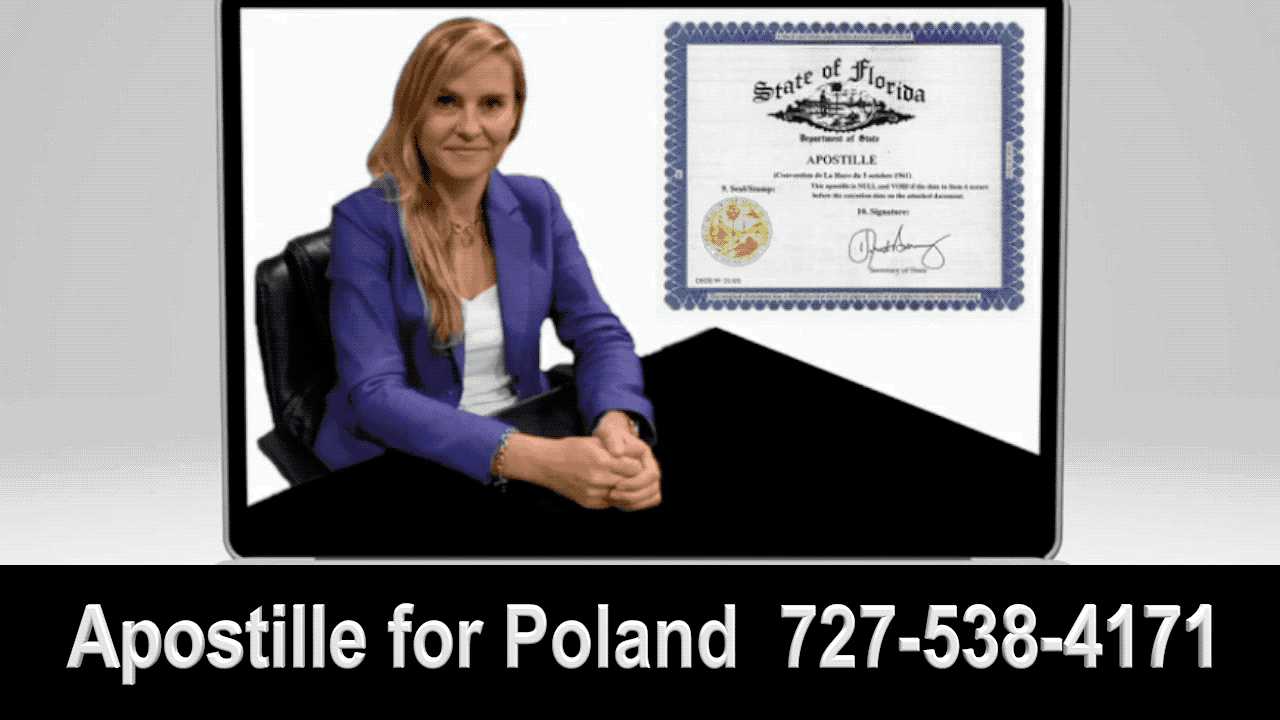
Attorney Piasecka, Polish speaking notary public commissioned in the State of Florida
Attorney Agnieszka “Aga” Piasecka is a Polish and Italian speaking notary public commissioned in the State of Florida. Agnieszka can assist you with your notarial needs online (via internet). For online notarization, your physical presence in Florida is not necessary but you have be a US citizen and confirm that you desire for the notarial act to be performed by a Florida notary public and under the general law of this state.
To schedule an online appointment, please call: 727-538-4171 or 813-786-3911
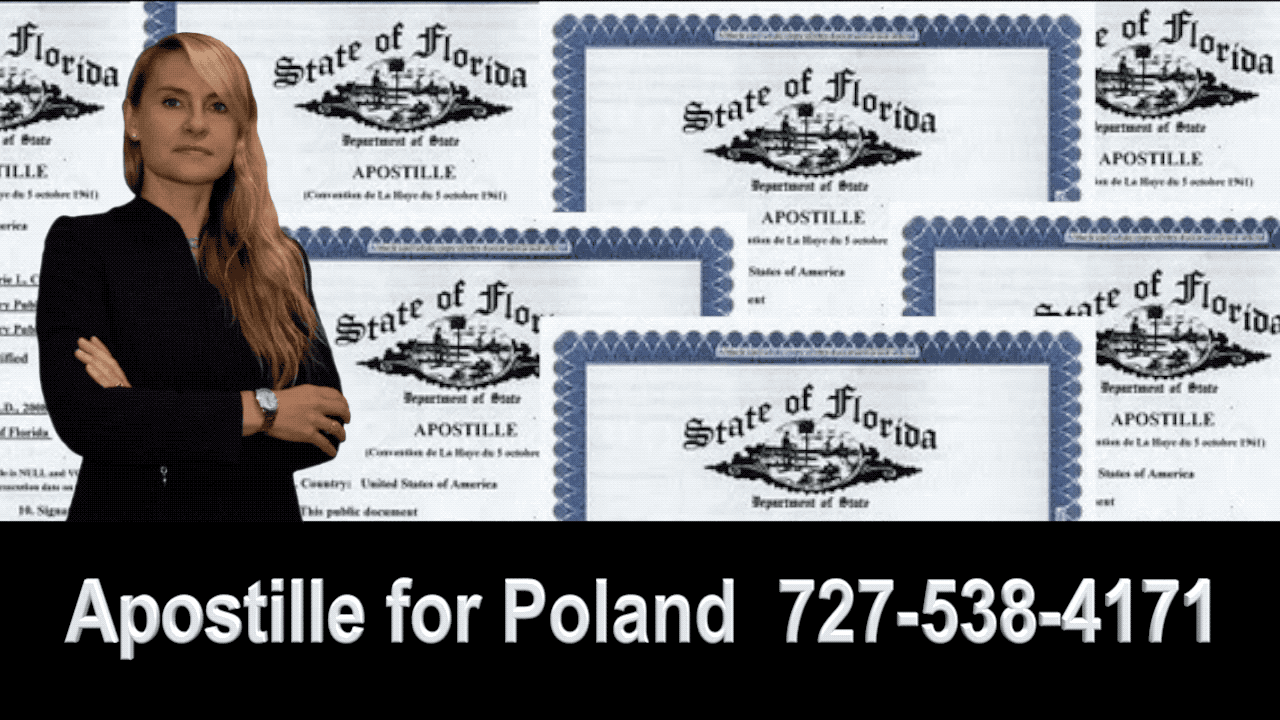
Hague Conference on Private International Law
CONVENTION ABOLISHING THE REQUIREMENT OF LEGALISATION FOR FOREIGN PUBLIC DOCUMENTS
(Concluded 5 October 1961)
The States signatory to the present Convention, Desiring to abolish the requirement of diplomatic or consular legalisation for foreign public documents, Have resolved to conclude a Convention to this effect and have agreed upon the following provisions:
Article 1
The present Convention shall apply to public documents which have been executed in the territory of one Contracting State and which have to be produced in the territory of another Contracting State.
For the purposes of the present Convention, the following are deemed to be public documents:
a) documents emanating from an authority or an official connected with the courts or tribunals of the State, including those emanating from a public prosecutor, a clerk of a court or a process-server (“huissier de justice”);
b) administrative documents;
c) notarial acts;
d) official certificates which are placed on documents signed by persons in their private capacity, such as official certificates recording the registration of a document or the fact that it was in existence on a certain date and official and notarial authentications of signatures.
However, the present Convention shall not apply:
a) to documents executed by diplomatic or consular agents;
b) to administrative documents dealing directly with commercial or customs operations.
Article 2
Each Contracting State shall exempt from legalisation documents to which the present Convention applies and which have to be produced in its territory. For the purposes of the present Convention, legalisation means only the formality by which the diplomatic or consular agents of the country in which the document has to be produced certify the authenticity of the signature, the capacity in which the person signing the document has acted and, where appropriate, the identity of the seal or stamp which it bears.
Article 3
The only formality that may be required in order to certify the authenticity of the signature, the capacity in which the person signing the document has acted and, where appropriate, the identity of the seal or stamp which it bears, is the addition of the certificate described in Article 4, issued by the competent authority of the State from which the document emanates.
However, the formality mentioned in the preceding paragraph cannot be required when either the laws, regulations, or practice in force in the State where the document is produced or an agreement between two or more Contracting States have abolished or simplified it, or exempt the document itself from legalisation.
Article 4
The certificate referred to in the first paragraph of Article 3 shall be placed on the document itself or on an “allonge”; it shall be in the form of the model annexed to the present Convention.
It may, however, be drawn up in the official language of the authority which issues it. The standard terms appearing therein may be in a second language also. The title “Apostille (Convention de La Haye du 5 octobre 1961)” shall be in the French language.
Article 5
The certificate shall be issued at the request of the person who has signed the document or of any bearer.
When properly filled in, it will certify the authenticity of the signature, the capacity in which the person signing the document has acted and, where appropriate, the identity of the seal or stamp which the document bears.
The signature, seal and stamp on the certificate are exempt from all certification.
Article 6
Each Contracting State shall designate by reference to their official function, the authorities who are competent to issue the certificate referred to in the first paragraph of Article 3.
It shall give notice of such designation to the Ministry of Foreign Affairs of the Netherlands at the time it deposits its instrument of ratification or of accession or its declaration of extension. It shall also give notice of any change in the designated authorities.
Article 7
Each of the authorities designated in accordance with Article 6 shall keep a register or card index in which it shall record the certificates issued, specifying:
a) the number and date of the certificate,
b) the name of the person signing the public document and the capacity in which he has acted, or in the case of unsigned documents, the name of the authority which has affixed the seal or stamp.
At the request of any interested person, the authority which has issued the certificate shall verify whether the particulars in the certificate correspond with those in the register or card index.
Article 8
When a treaty, convention or agreement between two or more Contracting States contains provisions which subject the certification of a signature, seal or stamp to certain formalities, the present Convention will only override such provisions if those formalities are more rigorous than the formality referred to in Articles 3 and 4.
Article 9
Each Contracting State shall take the necessary steps to prevent the performance of legalisations by its diplomatic or consular agents in cases where the present Convention provides for exemption.
Article 10
The present Convention shall be open for signature by the States represented at the Ninth Session of the Hague Conference on Private International Law and Iceland, Ireland, Liechtenstein and Turkey.
It shall be ratified, and the instruments of ratification shall be deposited with the Ministry of Foreign Affairs of the Netherlands.
Article 11
The present Convention shall enter into force on the sixtieth day after the deposit of the third instrument of ratification referred to in the second paragraph of Article 10.
The Convention shall enter into force for each signatory State which ratifies subsequently on the sixtieth day after the deposit of its instrument of ratification.
Article 12
Any State not referred to in Article 10 may accede to the present Convention after it has entered into force in accordance with the first paragraph of Article 11. The instrument of accession shall be deposited with the Ministry of Foreign Affairs of the Netherlands.
Such accession shall have effect only as regards the relations between the acceding State and those Contracting States which have not raised an objection to its accession in the six months after the receipt of the notification referred to in sub-paragraph d) of Article 15. Any such objection shall be notified to the Ministry of Foreign Affairs of the Netherlands.
The Convention shall enter into force as between the acceding State and the States which have raised no objection to its accession on the sixtieth day after the expiry of the period of six months mentioned in the preceding paragraph.
Article 13
Any State may, at the time of signature, ratification or accession, declare that the present Convention shall extend to all the territories for the international relations of which it is responsible, or to one or more of them. Such a declaration shall take effect on the date of entry into force of the Convention for the State concerned.
At any time thereafter, such extensions shall be notified to the Ministry of Foreign Affairs of the Netherlands.
When the declaration of extension is made by a State which has signed and ratified, the Convention shall enter into force for the territories concerned in accordance with Article 11. When the declaration of extension is made by a State which has acceded, the Convention shall enter into force for the territories concerned in accordance with Article 12.
Article 14
The present Convention shall remain in force for five years from the date of its entry into force in accordance with the first paragraph of Article 11, even for States which have ratified it or acceded to it subsequently.
If there has been no denunciation, the Convention shall be renewed tacitly every five years.
Any denunciation shall be notified to the Ministry of Foreign Affairs of the Netherlands at least six months before the end of the five year period.
It may be limited to certain of the territories to which the Convention applies.
The denunciation will only have effect as regards the State which has notified it. The Convention shall remain in force for the other Contracting States.
Article 15
The Ministry of Foreign Affairs of the Netherlands shall give notice to the States referred to in Article 10, and to the States which have acceded in accordance with Article 12, of the following:
a) the notifications referred to in the second paragraph of Article 6;
b) the signatures and ratifications referred to in Article 10;
c) the date on which the present Convention enters into force in accordance with the first paragraph of Article 11;
d) the accessions and objections referred to in Article 12 and the date on which such accessions take effect;
e) the extensions referred to in Article 13 and the date on which they take effect;
f) the denunciations referred to in the third paragraph of Article 14.
In witness whereof the undersigned, being duly authorised thereto, have signed the present Convention.
Done at The Hague the 5th October 1961, in French and in English, the French text prevailing in case of divergence between the two texts, in a single copy which shall be deposited in the archives of the Government of the Netherlands, and of which a certified copy shall be sent, through the diplomatic channel, to each of the States represented at the Ninth Session of the Hague Conference on Private International Law and also to Iceland, Ireland, Liechtenstein and Turkey.
Information obtained from: Hague Conference on Private International Law / Conférence de La Haye de droit international privé
